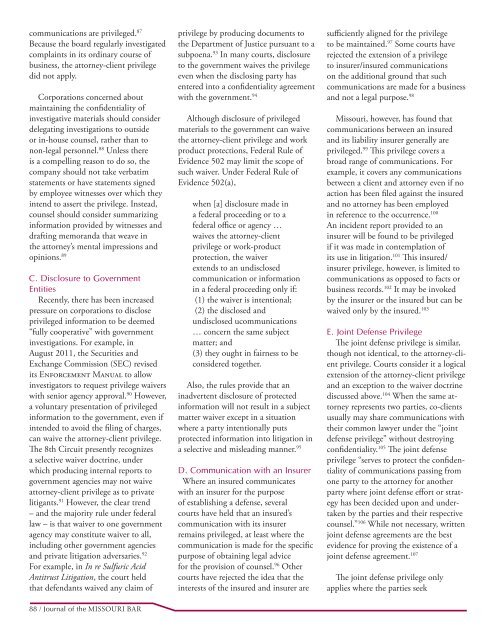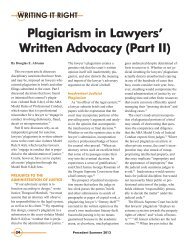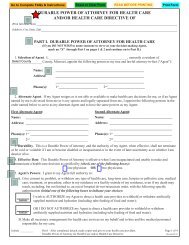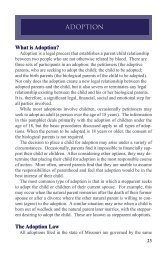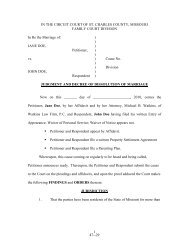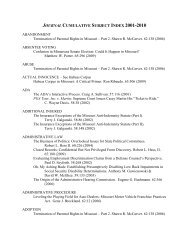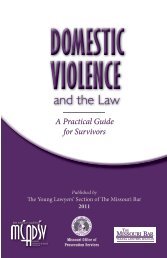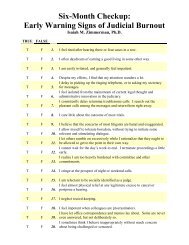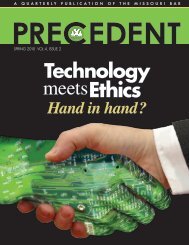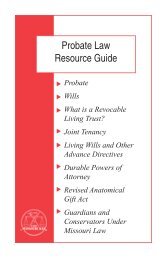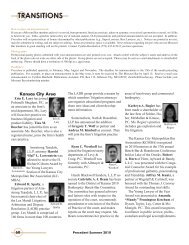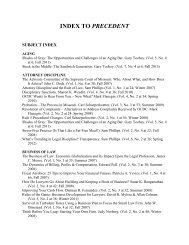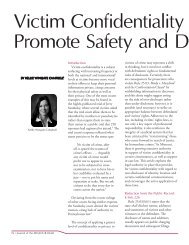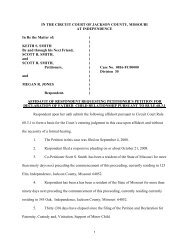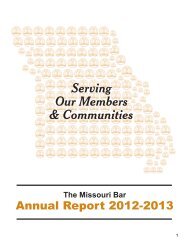An Essential Guide to Attorney-Client Privilege ... - the Missouri Bar
An Essential Guide to Attorney-Client Privilege ... - the Missouri Bar
An Essential Guide to Attorney-Client Privilege ... - the Missouri Bar
- No tags were found...
You also want an ePaper? Increase the reach of your titles
YUMPU automatically turns print PDFs into web optimized ePapers that Google loves.
communications are privileged. 87Because <strong>the</strong> board regularly investigatedcomplaints in its ordinary course ofbusiness, <strong>the</strong> at<strong>to</strong>rney-client privilegedid not apply.Corporations concerned aboutmaintaining <strong>the</strong> confidentiality ofinvestigative materials should considerdelegating investigations <strong>to</strong> outsideor in-house counsel, ra<strong>the</strong>r than <strong>to</strong>non-legal personnel. 88 Unless <strong>the</strong>reis a compelling reason <strong>to</strong> do so, <strong>the</strong>company should not take verbatimstatements or have statements signedby employee witnesses over which <strong>the</strong>yintend <strong>to</strong> assert <strong>the</strong> privilege. Instead,counsel should consider summarizinginformation provided by witnesses anddrafting memoranda that weave in<strong>the</strong> at<strong>to</strong>rney’s mental impressions andopinions. 89C. Disclosure <strong>to</strong> GovernmentEntitiesRecently, <strong>the</strong>re has been increasedpressure on corporations <strong>to</strong> discloseprivileged information <strong>to</strong> be deemed“fully cooperative” with governmentinvestigations. For example, inAugust 2011, <strong>the</strong> Securities andExchange Commission (SEC) revisedits Enforcement Manual <strong>to</strong> allowinvestiga<strong>to</strong>rs <strong>to</strong> request privilege waiverswith senior agency approval. 90 However,a voluntary presentation of privilegedinformation <strong>to</strong> <strong>the</strong> government, even ifintended <strong>to</strong> avoid <strong>the</strong> filing of charges,can waive <strong>the</strong> at<strong>to</strong>rney-client privilege.The 8th Circuit presently recognizesa selective waiver doctrine, underwhich producing internal reports <strong>to</strong>government agencies may not waiveat<strong>to</strong>rney-client privilege as <strong>to</strong> privatelitigants. 91 However, <strong>the</strong> clear trend– and <strong>the</strong> majority rule under federallaw – is that waiver <strong>to</strong> one governmentagency may constitute waiver <strong>to</strong> all,including o<strong>the</strong>r government agenciesand private litigation adversaries. 92For example, in In re Sulfuric Acid<strong>An</strong>titrust Litigation, <strong>the</strong> court heldthat defendants waived any claim ofprivilege by producing documents <strong>to</strong><strong>the</strong> Department of Justice pursuant <strong>to</strong> asubpoena. 93 In many courts, disclosure<strong>to</strong> <strong>the</strong> government waives <strong>the</strong> privilegeeven when <strong>the</strong> disclosing party hasentered in<strong>to</strong> a confidentiality agreementwith <strong>the</strong> government. 94Although disclosure of privilegedmaterials <strong>to</strong> <strong>the</strong> government can waive<strong>the</strong> at<strong>to</strong>rney-client privilege and workproduct protections, Federal Rule ofEvidence 502 may limit <strong>the</strong> scope ofsuch waiver. Under Federal Rule ofEvidence 502(a),when [a] disclosure made ina federal proceeding or <strong>to</strong> afederal office or agency …waives <strong>the</strong> at<strong>to</strong>rney-clientprivilege or work-productprotection, <strong>the</strong> waiverextends <strong>to</strong> an undisclosedcommunication or informationin a federal proceeding only if:(1) <strong>the</strong> waiver is intentional;(2) <strong>the</strong> disclosed andundisclosed ucommunications… concern <strong>the</strong> same subjectmatter; and(3) <strong>the</strong>y ought in fairness <strong>to</strong> beconsidered <strong>to</strong>ge<strong>the</strong>r.Also, <strong>the</strong> rules provide that aninadvertent disclosure of protectedinformation will not result in a subjectmatter waiver except in a situationwhere a party intentionally putsprotected information in<strong>to</strong> litigation ina selective and misleading manner. 95D. Communication with an InsurerWhere an insured communicateswith an insurer for <strong>the</strong> purposeof establishing a defense, severalcourts have held that an insured’scommunication with its insurerremains privileged, at least where <strong>the</strong>communication is made for <strong>the</strong> specificpurpose of obtaining legal advicefor <strong>the</strong> provision of counsel. 96 O<strong>the</strong>rcourts have rejected <strong>the</strong> idea that <strong>the</strong>interests of <strong>the</strong> insured and insurer aresufficiently aligned for <strong>the</strong> privilege<strong>to</strong> be maintained. 97 Some courts haverejected <strong>the</strong> extension of a privilege<strong>to</strong> insurer/insured communicationson <strong>the</strong> additional ground that suchcommunications are made for a businessand not a legal purpose. 98<strong>Missouri</strong>, however, has found thatcommunications between an insuredand its liability insurer generally areprivileged. 99 This privilege covers abroad range of communications. Forexample, it covers any communicationsbetween a client and at<strong>to</strong>rney even if noaction has been filed against <strong>the</strong> insuredand no at<strong>to</strong>rney has been employedin reference <strong>to</strong> <strong>the</strong> occurrence. 100<strong>An</strong> incident report provided <strong>to</strong> aninsurer will be found <strong>to</strong> be privilegedif it was made in contemplation ofits use in litigation. 101 This insured/insurer privilege, however, is limited <strong>to</strong>communications as opposed <strong>to</strong> facts orbusiness records. 102 It may be invokedby <strong>the</strong> insurer or <strong>the</strong> insured but can bewaived only by <strong>the</strong> insured. 103E. Joint Defense <strong>Privilege</strong>The joint defense privilege is similar,though not identical, <strong>to</strong> <strong>the</strong> at<strong>to</strong>rney-clientprivilege. Courts consider it a logicalextension of <strong>the</strong> at<strong>to</strong>rney-client privilegeand an exception <strong>to</strong> <strong>the</strong> waiver doctrinediscussed above. 104 When <strong>the</strong> same at<strong>to</strong>rneyrepresents two parties, co-clientsusually may share communications with<strong>the</strong>ir common lawyer under <strong>the</strong> “jointdefense privilege” without destroyingconfidentiality. 105 The joint defenseprivilege “serves <strong>to</strong> protect <strong>the</strong> confidentialityof communications passing fromone party <strong>to</strong> <strong>the</strong> at<strong>to</strong>rney for ano<strong>the</strong>rparty where joint defense effort or strategyhas been decided upon and undertakenby <strong>the</strong> parties and <strong>the</strong>ir respectivecounsel.” 106 While not necessary, writtenjoint defense agreements are <strong>the</strong> bestevidence for proving <strong>the</strong> existence of ajoint defense agreement. 107The joint defense privilege onlyapplies where <strong>the</strong> parties seek88 / Journal of <strong>the</strong> MISSOURI BAR


